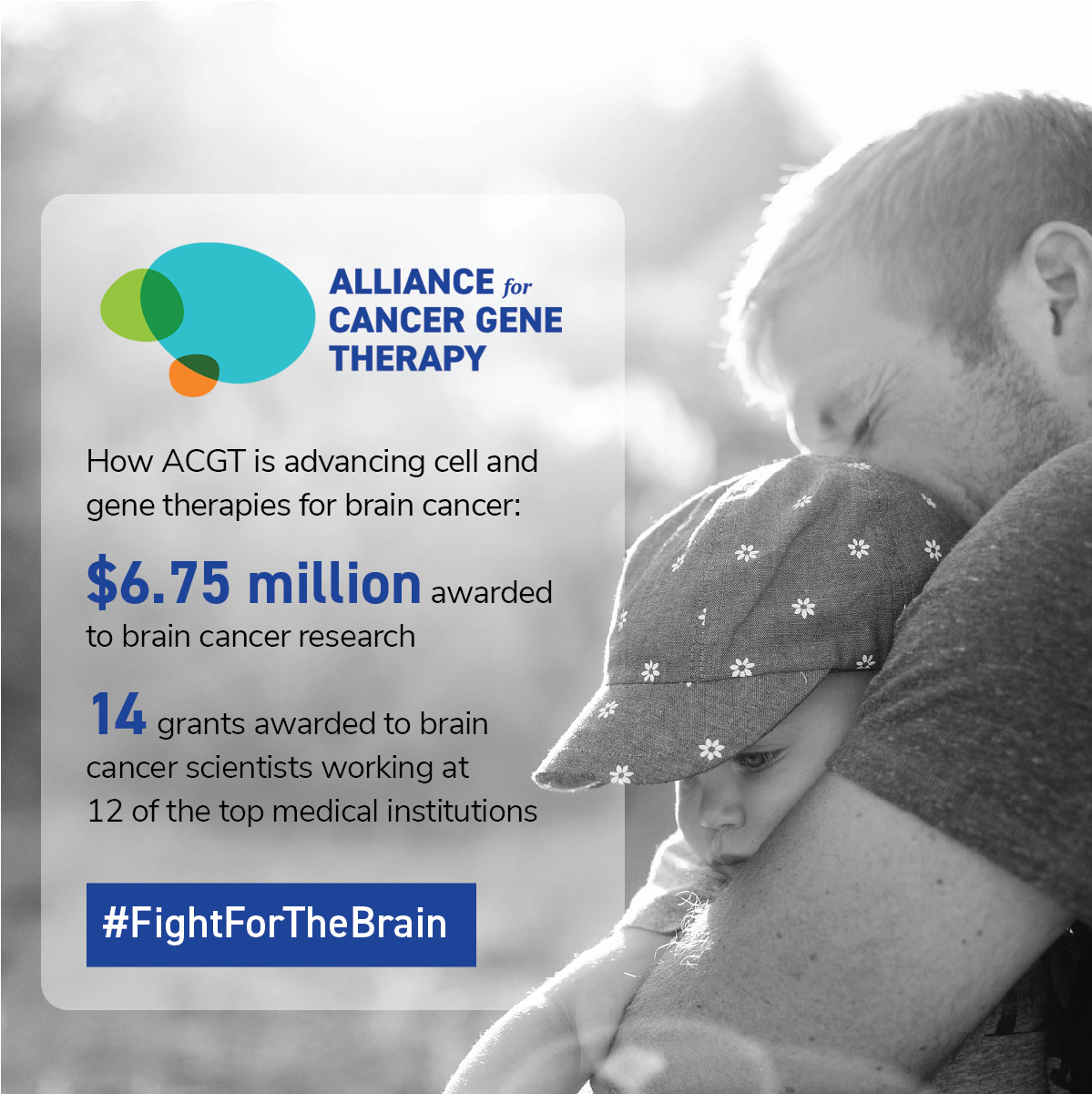Brain cancer is one of the most aggressive and most difficult-to-treat cancers. The involvement of the brain makes surgery difficult, and therapies such as chemotherapy and radiation therapy can be limited in their effectiveness.
This is why there’s a need for new therapies to help people diagnosed with brain tumors. Cancer cell and gene therapy harnesses the power of our own immune system to fight cancer naturally with less harm to healthy tissue than chemotherapy and radiation.
Scientists can make genetic changes to our immune system to help it find and fight cancer cells – creating a “living medicine” that not only can wipe out cancer but also could prevent it from returning.
Please sign up for research updates from ACGT for brain cancer and other types of cancer. Our monthly email newsletter will help you stay informed on the latest in cancer cell and gene therapy.
Facts About Brain Cancer
The American Cancer Society estimates there are approximately 25,000 new cases of brain cancer and spinal cord cancer diagnosed in the U.S. each year. Nearly 19,000 people in the U.S. die from brain and spinal cord tumors annually.
Brain cancer affects children at a particularly high rate:
- Brain and spinal cord tumors are the second most common type of cancer diagnosed in children (after leukemia) and account for about 25% of childhood cancer cases.
- More than 4,000 cases of brain and spinal cord cancer are diagnosed in U.S. children each year.
The life expectancy for people with brain cancer is often low. For instance, glioblastoma is one of the most common brain tumors. The 5-year survival rate is less than 7%, and the average survival is 8-10 months.
Cell and gene therapy has the potential to help improve these survival statistics.
How ACGT is advancing cell and gene therapy research for brain cancer

In 2001, Alliance for Cancer Gene Therapy (ACGT) was founded as one of the first and only nonprofit organizations committed to pursuing advancements in cancer cell and gene therapy.
Over the past two-plus decades, ACGT has awarded 67 research grants totaling $34.2 million to 63 of the brightest scientists. Brain cancer is at the top of the priority list for ACGT. The research foundation has funded 14 brain tumor projects, the most of any type of cancer, totaling $6.75 million.
ACGT also recently invested $2.25 million as part of a collaboration with the Parker Institute for Cancer Immunotherapy and the Cancer Research Institute to improve our understanding of glioblastoma and provide scientists with the largest database of patient tissue samples for research.
Here are other ways in which ACGT is helping advance cell and gene therapy research for brain cancers.
#FightForTheBrain Campaign
There is both progress and potential in using cell and gene therapy to treat brain cancer. This is why Alliance for Cancer Gene Therapy (ACGT) created the #FightForTheBrain campaign in 2023 to raise awareness of how cell and gene therapy may help save the lives of brain cancer patients.
The campaign aligns with Brain Cancer Awareness Month (May) and highlights recent advancements in the field of cell and gene therapy.
Help support ACGT’s #FightForTheBrain campaign by signing up for our monthly email newsletter. You’ll stay informed with the latest news about cell and gene therapy. You can also support our #FightForTheBrain initiative by following us on our social media channels:
Recent ACGT grant to support pediatric brain tumor clinical trial
One of the latest efforts by ACGT is the recent grant made to Hideho Okada, MD, PhD, of the University of California San Francisco.
Dr. Okada is developing a cell and gene therapy to help treat children with diffuse midline glioma, which is a type of brain tumor most often diagnosed in children. ACGT’s grant will help him run a phase 1 clinical trial.
ACGT linked to major breakthrough in brain cancer research
ACGT’s funding of past cell and gene therapy projects has also led to breakthroughs with brain cancer. The most significant is ACGT’s funding of pediatric cancer expert Crystal Mackall, MD, of Stanford University.
Dr. Mackall’s grant from ACGT was to help develop a cell and gene therapy for children with osteosarcoma and neuroblastoma.
From her research, she and her colleagues learned that this therapy could also be used to treat children with diffuse midline glioma.
A phase 1 trial has led to some extraordinary survival times. USA Today published an article in 2022 featuring a few patients enrolled, including a 5-year-old patient who was alive approximately one year following her diagnosis.
Page sources
- Key Statistics for Brain and Spinal Cord Tumors. American Cancer Society. Retrieved from: https://www.cancer.org/cancer/brain-spinal-cord-tumors-adults/about/key-statistics.html. Accessed: 04/03/2023.
- Key Statistics for Brain and Spinal Cord Tumors in Children. American Cancer Society. Retrieved from: https://www.cancer.org/cancer/brain-spinal-cord-tumors-children/about/key-statistics.html. Accessed: 04/03/2023.
- Brain Tumor: Statistics. American Society of Clinical Oncology. Retrieved from: https://www.cancer.net/cancer-types/brain-tumor/statistics. Accessed: 04/03/2023.
- What Are the Most Common Types of Brain Tumors? Penn Medicine. Retrieved from: https://www.pennmedicine.org/updates/blogs/neuroscience-blog/2018/november/what-are-the-most-common-types-of-brain-tumors. Accessed: 04/03/2023.



